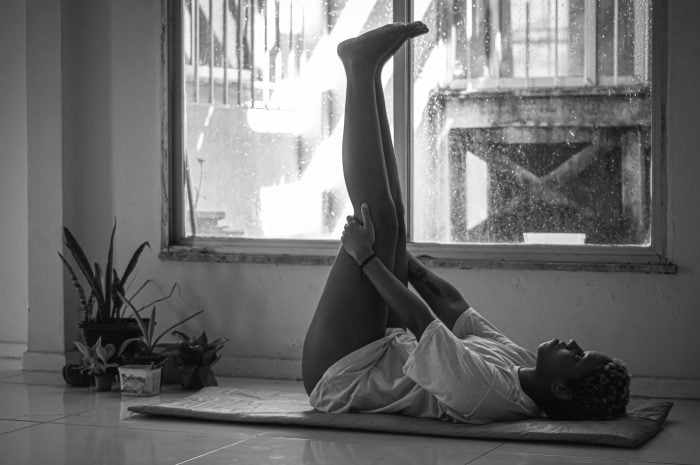|
|
18 - The magic, spiritual number. ONE - The ONENESS that is ALL. All there ever was; All there ever is; All there will ever BE! (8) INFINITY - The ETERNAL PRESENT Moment. Eternity; Forever! That which was never born; never dies!
|
I believe God wants you to know ... ... that a hunch is
angel talk, and probably should not be ignored. Listen to your
hunches, pay attention to your intuition, do not dismiss your
random thoughts, inspirations or ideas. Heaven talks
in snippets, not in speeches. Angels whisper fast. They
have to when they're flying around... Honor your Hints
from Heaven. They could be
giving you the best advice you ever had. |
|
|
|
|
View this post on Instagram
Christmas music, hot cocoa, and holiday invites are starting to pour. I am sitting in Germany, staring at a Christmas tree while writing this article. What am I doing in Germany? It’s a long story, but I want to share the short version with you.
My parents loved Germany. My dad was a metallurgical engineer, and the company that he worked for had offices in Germany. In the 80s and 90s, the world wasn’t global. Between India (country of origin) and North Africa (my parents’ country of residence for 15 years because Dad’s job had him posted there), Germany was a representation of an efficient, modern, first-world country. My Mother loved the German departmental stores (new concept to her) and the Christmas spirit.
In one of our conversations in 2013, Mom had mentioned that she’d like to visit Germany. They hadn’t experienced the post-Berlin wall country or the culture. My mom died suddenly at age 66 on her way to Kashmir with Dad. Since Mom couldn’t revisit Germany, I promised my dad that we’d bring him to Germany to honor Mom’s 10th death anniversary. He liked the idea.
We can make all the plans, but the universe has a mind of its own. In May 2023, three days prior to Mom’s ninth death anniversary, Dad unexpectedly fell sick and passed away.
In the last year and a half, I have put a lot of energy into grief healing—both mine and other people’s. I became a certified Grief Coach who uses Ayurvedic principles to help people navigate their grief. In my practice as an Ayurvedic Doctor, I see clients who are sick because of their unresolved grief stemming from a myriad of issues.
Finally, a year and a half after losing Dad, I felt ready to keep my promise—Mom and Dad are gone, but I wanted to honor their one wish of visiting Germany. I feel so grateful that my husband and I are aligned in our grieving…we have learned to embrace grief with grace, openness, celebrations, stories, and occasional hollowness. I am grateful that we celebrate those of us alive with utmost gratitude but also honor those deceased with the same love—be it my father-in-law or my parents.
We decided that addressing grief won’t be easy, but denying it will be even more difficult. The only way out of grief is through it, not around or below or above it. You can pretend to not see it and push it away, but it sneaks up when you are least expecting it.
Grief is a deeply personal journey that cannot be rushed or avoided. It requires facing your emotions, allowing yourself to feel the pain, and gradually learning to live with the loss. I see family, friends, colleagues, and clients rush their grief. As a result, they turn to food, alcohol, sex, substance abuse, and so on to cope with the hole left behind. They make emotionally and physically unhealthy choices. They curate one version of their “happy life” for social media; at home and in real life, it’s a whole other story.
I know people who “abandon” their day-to-day and keep traveling to newer places to find the peace that loss snatches away. But let me remind you that outside distractions only create an illusion of healing; the minute you return to your life, grief will ask for your attention. Grief is relentless, and it won’t give up until you do the work. I have seen people build walls of silence around grief…pretending if they don’t see it, quietly grief will find another door. But when the wall comes crumbling down, grief ruins lives.
Acknowledging your feelings: Recognizing and accepting the emotions that come with loss, whether they’re sadness, anger, confusion, or numbness. You don’t need to project or perform or explain yourself to anyone. Grief is temperamental, and it shows us a side to ourselves that we didn’t know existed at all. If you were estranged from the deceased person, there is grief of what could have been and never was.
Giving yourself time: Understanding that healing is not linear and there’s no set timeline for grief. Be gentle with yourself, especially as the holiday fervor creates loneliness. Something as simple as holiday cooking and aromas can bring up memories. There is no Christmas tree that doesn’t remind me of Mom. I think she was sadder when I found out that Santa wasn’t real because she was able to live her Christmas fantasies through me.
Seeking intentional support: Grief can create moments of emptiness and unground you. Connecting with friends, family, support groups, or professional counselors who can provide comfort and guidance while being okay with disengaging with those who never seem to be present in relationships. Don’t let familiarity be the reason you spend time with anyone. A friend confessed that when she was at her lowest, her childhood best friend said, “I don’t have the bandwidth for her,” to a third party. That’s underhanded gossip!
Gradually rebuilding: Slowly rediscovering purpose and joy while carrying the memory of your loss with you. Give old relationships (unless they were traumatic) a new chance as grief can be transformative, and you aren’t the only one changing because of it.
Honoring the memory: Finding meaningful ways to remember and celebrate the person or thing you’ve lost. No matter the holiday or festivities, we talked about my father-in-law, Mom, and Dad. We cook at home or go out to eat their favorite meals on their birthdays and anniversaries. We visit the Ganesha Temple. But we don’t just romanticize the dead; we also get angry at the wrong they did, even if unintentionally. The minute we allow ourselves to embrace the fact that our deceased loved ones were flawed, ordinary, yet special like any of us…then grief doesn’t hold a grip on us anymore.
A friend saw one of my pictures from this trip and wrote, “I see a glow but also calm and peace on your face.” While the pain may never completely disappear, you can learn to carry grief differently over time. While in Germany, I feel grateful and only grateful to be back in a place that mattered to my parents and my own healing. There is no heavy cloud over my head.
I can’t emphasize enough that the only way out of grief is through it. Grief is not about “getting over” a loss but about learning to live with it, finding meaning, and slowly opening yourself to hope and new experiences. Each person’s grief journey is unique, and there’s no right or wrong way to navigate through it.
“Grief is like the ocean; it comes on waves ebbing and flowing. Sometimes the water is calm, and sometimes it is overwhelming. All we can do is learn to swim.” ~ Vicki Harrison
~

Sweta Srivastava Vikram is an international speaker, best-selling author of 13 books, and Ayurveda and mindset coach who is committed to helping people thrive on their own te… Read full bio

Last year, I was living in Bangkok, sweating freely, swimming in the ocean, and savoring foods with names I couldn’t even pronounce.
Life was warm, vibrant, and full of possibility.
But now, back in Switzerland, my body feels like it’s turning against me, progressively limiting what I can do.
This summer, I couldn’t even dip in the ocean without my skin burning and turning red from the salt. I couldn’t enjoy the late summer heat; my skin would rash and inflame at the slightest sweat, and I had to give up beloved activities like biking, swimming, and HIIT training. Even a warm bath has been out of reach for over nine months. Tepid showers have become my new normal. My diet shifted to low-histamine foods to avoid triggering my symptoms, meaning avocados, tomatoes, and so many of my old favorites are off the table.
Through it all, I’m learning a massive lesson in appreciation.
The small things we often take for granted, like a bath or a ripe tomato, are things I now dream about. My daughter sometimes complains about her bath, but I would give anything for a hot soak again. And while we complain about the heat, sweating is truly a privilege—a sign our bodies are functioning well.
This year has taught me so much about adapting and finding new ways to move forward. Now, exercise happens with fans and ice packs on standby, and my goals have shifted. Small improvements are worth celebrating. I’m learning to tend to emotional traumas and stressors, which I realize can take a toll on the body if left unaddressed. Ignoring them only lets them grow, eventually forcing us to pay attention.
Health isn’t linear.
It’s not about a fit body, a number on a scale, or a rigid exercise program. It’s about adapting, finding resilience, and honoring the journey, however unpredictable it may be. Social media often makes health look effortless, but trust me, this year has been anything but easy. Last year, I struggled with thoracic outlet syndrome from years of shoulder overuse, relearning my backbends, push-ups, and handstands. This year, I’m battling something new.
Let’s remember that everyone’s journey is unique. Instead of feeling disheartened by others’ “perfect” health stories, let’s be inspired. Health isn’t about perfection; it’s about making peace with what we have and continuing forward despite the challenges.
Some of my goals for next year:
>> A warm bath
>> Eating tomatoes
>> Swimming in the ocean
>> One-arm handstand
>> Sitting in the warm sun, feeling my skin alive and safe.
To those of you also struggling, you’re not alone. What you see on social media is just a glimpse, not the full journey. We’re in this together.
Here are some helpful strategies for those navigating health challenges, especially when adapting to physical limitations and managing self-compassion during these times:
1. Set Small, Achievable Goals
Why it helps: Setting small, attainable goals helps create a sense of progress without overwhelming yourself. Instead of focusing on what you used to be able to do, shift to what you can do now, however small.
How to do it: Start with something manageable like gentle stretching, short walks, or meditation. Celebrate every little win; these small steps add up and can build momentum.
2. Shift Focus from “Perfect Health” to Adaptability
Why it helps: Health is often portrayed as a destination, but it’s really about adapting to changes. This shift helps us accept the natural ups and downs in our journey.
How to do it: Embrace flexibility in your routines, and focus on how you can adapt exercises or daily tasks to fit your current abilities. For example, you might replace high-impact workouts with low-impact alternatives or explore mindfulness exercises if physical activity is limited.
3. Practice Self-Compassion Regularly
Why it helps: Self-compassion alleviates self-blame and allows space for healing. When health challenges arise, it’s natural to feel frustrated, but showing ourselves kindness can ease the emotional toll.
How to do it: Recognize the inner critic and counter it with affirmations. Remind yourself, “I am doing my best,” or “It’s okay to struggle.” Journaling can also help release feelings and reframe them with compassion.
4. Find Ways to Nurture Joy Daily
Why it helps: Health issues can limit physical activities but not emotional fulfillment. Small joys lift the spirit and remind us of the beauty still available in life.
How to do it: Make time for small activities that bring you joy, like listening to music, reading, or engaging in a hobby. Consider exploring new interests that are compatible with your current health, such as painting, baking, or gardening.
5. Let Go of Comparison
Why it helps: Comparison often leads to feelings of inadequacy or self-criticism, especially when looking at others’ health journeys.
Remember, everyone’s path is different.
This account does not have permission to comment on Elephant Journal.
Contact support with questions.

Rhyanna Watson‘s barefoot, footloose, and fancy free Tassie Devil approach will keep you smiling. Her soul-moving, truth-telling, fitness, motherhood, and yoga, sensual,… Read full bio
This account does not have permission to comment on Elephant Journal.
Contact support with questions.